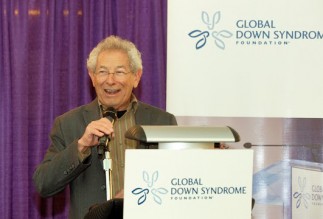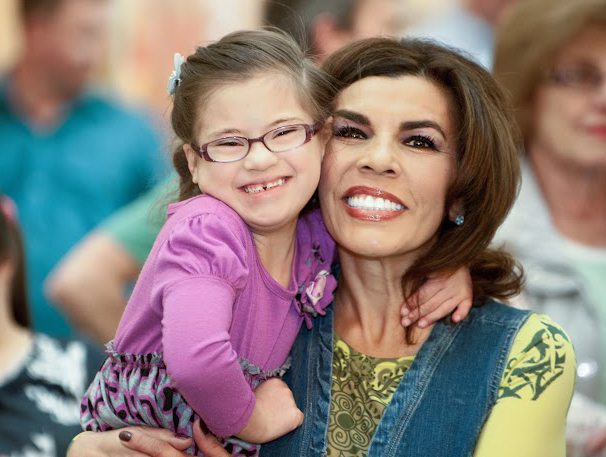Linda Crnic Institute for Down Syndrome Awards $1 Million in 2015 Crnic Grand Challenge Grants Supporting 10 Researchers
Crnic-Related Grant Programs Support 33 Labs and Over 100 Scientists Focused on Down Syndrome Research
 DENVER (March 20, 2015) – To commemorate World Down Syndrome Day, the Linda Crnic Institute for Down Syndrome announced $1 million in Crnic Grand Challenge Grants to 10 researchers, raising the number of labs in Colorado working on Down syndrome research to 28, and the total labs supported by Crnic to 33. In the past three years, $5.7 million in grants have been awarded to Crnic-related grants programs supporting over 100 scientists focused on Down syndrome research.
DENVER (March 20, 2015) – To commemorate World Down Syndrome Day, the Linda Crnic Institute for Down Syndrome announced $1 million in Crnic Grand Challenge Grants to 10 researchers, raising the number of labs in Colorado working on Down syndrome research to 28, and the total labs supported by Crnic to 33. In the past three years, $5.7 million in grants have been awarded to Crnic-related grants programs supporting over 100 scientists focused on Down syndrome research.
 Crnic Institute Executive Director Tom Blumenthal announces the 2015 Crnic Grand Challenge Grants at the World Down Syndrome Day celebration at Children’s Hospital Colorado  Clarissa and Carol Capuano at the World Down Syndrome Day celebration |
Crnic Grand Challenge Grant recipients are chosen based on the strength of their proposed science and the likelihood such science will lead to improving outcomes for people with Down syndrome. The research addresses conditions that disproportionately affect people with Down syndrome, such as Alzheimer’s disease, leukemia, cognitive deficits, and autoimmune disease, as well as research into genetic understanding and why people with Down syndrome rarely get solid-tumor cancers. All grant recipients commit to becoming part of a Down Syndrome Supergroup that meets monthly to discuss science related to Down syndrome.
“The Crnic Grand Challenge Grants have transformed Down syndrome research at the University of Colorado so that people throughout the university are not only aware of the potential but also jumping at the chance to incorporate it into their labs,” said Tom Blumenthal, Ph.D., executive director of the Crnic Institute. “The sharing of ideas and developments among the Supergroup is an exciting way to move research forward and focus on the ways it can benefit people with Down syndrome and other conditions like Alzheimer’s disease and cancer.”
Thirty-one researchers from the University of Colorado at Boulder and the University of Colorado School of Medicine on the Anschutz Medical Campus applied for the 2015 Crnic Grand Challenge Grants. The proposals were reviewed by an elite group of scientists, including Blumenthal; Fran Hickey, M.D., Medical Director of the Anna and John J. Sie Center for Down Syndrome; Joaquin Espinosa, Ph.D., Min Han, Ph.D., and Ken Krauter, Ph.D., of the CU-Boulder Department of Molecular, Cellular and Developmental Biology; Sandy Martin, Ph.D., of the CU School of Medicine’s Department of Cell and Developmental Biology; Tamim Shaikh, Ph.D., of the CU School of Medicine’s Department of Pediatrics; James DeGregori, Ph.D., of the CU School of Medicine’s Department of Biochemistry and Molecular Genetics; and Christopher Link, Ph.D., of the CU-Boulder Department of Integrative Physiology.
The researchers receiving grants are:
- Charles A. Hoeffer, Ph.D., CU-Boulder: Test the idea that overexpression of Regulator of calcineurin 1, a key gene on chromosome 21, promotes the development of Alzheimer’s disease-related neuropathology in Down syndrome
- Kevin Jones, Ph.D., CU-Boulder: Test whether increasing the abundance of the BDNF protein can prevent Down syndrome pathology and cognitive deficits in a mouse model
- Matthew Kennedy, Ph.D., CU School of Medicine: Investigate how increased beta-amyloid production causes synapse loss in hope of finding targets for future therapies
- Changwei Liu, Ph.D., CU School of Medicine: Determine the effect of USP16 gene overexpression on a large number of other cellular proteins to determine whether USP16 may be key to many Down syndrome phenotypes
- Ken Maclean, Ph.D., CU School of Medicine: Test a highly specific inhibitor of a key protein active in the Unfolded Protein Response as a potential therapeutic target for cognitive deficits in Down syndrome
- William Old, Ph.D., CU-Boulder: Identify genes with altered protein expression in Down syndrome to develop new therapeutic strategies to alleviate issues with neurodevelopment and neurodegenerative pathologies
- Bradley Olwin, Ph.D., CU-Boulder: Test whether adult stem cell dysfunction may underlie premature aging phenotypes associated with Down syndrome.
- Anne-Laure Perraud, Ph.D., CU School of Medicine and National Jewish Health: Determine the role of a chromosome 21 protein that forms an ion channel in innate immune dysfunction in Down syndrome
- Jerry Stitzel, Ph.D., CU-Boulder: Identify gene expression changes in a key group of neurons before and after the onset of degeneration, in hopes of improving our understanding of the molecular pathology of neuron loss in Down syndrome
- Michael Yeager, Ph.D., CU School of Medicine: Understand immune system disturbances and autoimmune phenomena in individuals with Down syndrome that cause lung disease
A full list of grant recipients and descriptions of the research is available at globaldownsyndrome.org/crnicgrants.
The grant program is underwritten by the Anna and John J. Sie Foundation, the Global Down Syndrome Foundation, the Chancellors of the CU Boulder and Denver campuses and the Dean of the CU School of Medicine.
The Crnic Grand Challenge Grants are an annual infusion of funding into Down syndrome research, which is one of the least-funded by the National Institutes of Health despite the fact that it affects one in every 691 births in the U.S. The grant process begins each year with a symposium to educate CU researchers about Down syndrome, which kick-starts the application process.
The announcement of the grants coincides with World Down Syndrome Day (March 21), which takes place on 3/21 each year because people with Down syndrome have 3 copies of the 21st chromosome, compared with the typical population, who have 2 copies.
About the Global Down Syndrome Foundation
The Global Down Syndrome Foundation is a public nonprofit 501(c)(3) dedicated to significantly improving the lives of people with Down syndrome through research, medical care, education and advocacy. Formally established in 2009, Global has the primary focus of supporting the Linda Crnic Institute for Down Syndrome, the first academic home in the U.S. committed to research and medical care for people with the condition. Fundraising and government advocacy that corrects the alarming disparity of national funding for people with Down syndrome is a major short-term goal. Global organizes the Be Beautiful Be Yourself Fashion Show – the single-largest annual fundraiser benefiting people with Down syndrome. Programmatically, Global organizes and funds many programs and conferences, including the Dare to Play Football and Cheer Camps, Global Down Syndrome Educational Series, and Be Beautiful Be Yourself Dance Program. Global is an inclusive organization without political or religious affiliation or intention.
About the Linda Crnic Institute for Down Syndrome
The Linda Crnic Institute for Down Syndrome is the first medical and research institute with the mission to provide the best clinical care to people with Down syndrome, and to eradicate the medical and cognitive ill effects associated with the condition. Established in 2008, the Crnic Institute is a partnership between the University of Colorado School of Medicine, the University of Colorado Boulder, and Children’s Hospital Colorado. Headquartered on the Anschutz Medical Campus in Aurora, the Crnic Institute includes the Anna and John J. Sie Center for Down Syndrome at Children’s Hospital Colorado. It partners both locally and globally to provide life-changing research and medical care for individuals with Down syndrome. The Crnic Institute is made possible by the generous support of the Anna and John J. Sie Foundation, and relies on the Global Down Syndrome Foundation for fundraising, education, awareness and government advocacy. It is a research and medical-based organization without political or religious affiliation or intention.
###

 Experience our inspirational and groundbreaking videos and photos. Our children and self-advocates are beautiful AND brilliant!
Experience our inspirational and groundbreaking videos and photos. Our children and self-advocates are beautiful AND brilliant! Make sure your local Representatives are on the Congressional Down Syndrome Task Force.
Make sure your local Representatives are on the Congressional Down Syndrome Task Force.